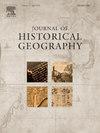Governing the private scales of families and homes: Visiting nurses and Turkey's mobilization of consumptive care
IF 1.3
2区 历史学
Q2 GEOGRAPHY
引用次数: 0
Abstract
In the late nineteenth and early twentieth centuries, the visiting nurses of western empires and nation-states performed vital labor in combating tuberculosis (TB). Their hybrid role combined modern nursing and social work, typically benefitting from civil society organizations. In late Ottoman and early republican Turkey, tuberculosis resulted in many fatalities. To overcome this biopolitical challenge, the state prioritized creating a network of dispensaries and visiting nurses. Going into citizens' homes and communities, these nurses were to both educate the public on TB prevention and treatment and report their health and personal data to the state. Envisioned as essential public health agents, visiting nurses bridged gaps in hygiene education and demographic data collection. However, the republic struggled with insufficient resources to recruit, train, and deploy them effectively. Our study explores the evolving vision of leveraging women's labor for public health and geopolitical aims. By analyzing key thinkers' writings, legislative efforts, and the delayed realization of a visiting nurse corps post-1945, we highlight efforts to professionalize women and expand their societal roles. These mobile public health initiatives not only advanced women's status but also marked a significant development in Turkey's public health and medical governance.
管理家庭和家庭的私人规模:访问护士和土耳其的消费护理动员
在19世纪末和20世纪初,西方帝国和民族国家的来访护士在抗击结核病方面发挥了至关重要的作用。他们的混合角色结合了现代护理和社会工作,通常受益于民间社会组织。在奥斯曼帝国晚期和共和土耳其早期,肺结核导致了许多人死亡。为了克服这一生物政治挑战,该州优先建立了一个由药房和探访护士组成的网络。这些护士进入公民的家庭和社区,既要教育公众预防和治疗结核病,又要向国家报告他们的健康和个人数据。访问护士被设想为必不可少的公共卫生代理人,弥补了卫生教育和人口数据收集方面的差距。然而,共和国在招募、训练和有效部署他们方面资源不足。我们的研究探讨了利用妇女劳动促进公共卫生和地缘政治目标的不断发展的愿景。通过分析主要思想家的著作、立法努力以及1945年后探访护士团的延迟实现,我们强调了妇女专业化和扩大其社会角色的努力。这些流动的公共卫生倡议不仅提高了妇女地位,而且标志着土耳其公共卫生和医疗治理的重大发展。
本文章由计算机程序翻译,如有差异,请以英文原文为准。
求助全文
约1分钟内获得全文
求助全文
来源期刊

Journal of Historical Geography
Multiple-
CiteScore
1.50
自引率
10.00%
发文量
53
期刊介绍:
A well-established international quarterly, the Journal of Historical Geography publishes articles on all aspects of historical geography and cognate fields, including environmental history. As well as publishing original research papers of interest to a wide international and interdisciplinary readership, the journal encourages lively discussion of methodological and conceptual issues and debates over new challenges facing researchers in the field. Each issue includes a substantial book review section.
 求助内容:
求助内容: 应助结果提醒方式:
应助结果提醒方式:


